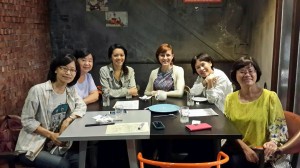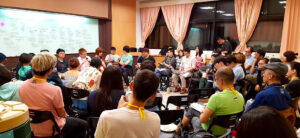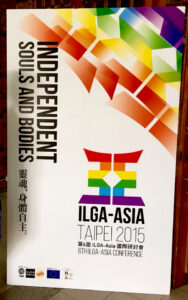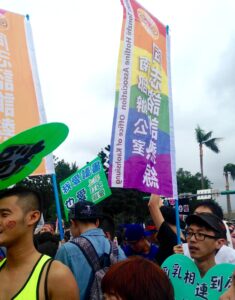Engaged Anthropology Grant: Amy Brainer

Amy Brainer is an Assistant Professor of Women’s & Gender Studies and Sociology at the University of Michigan-Dearborn. In 2011 while a doctoral student at the University of Illinois-Chicago, she received a Dissertation Fieldwork Grant to aid research on ‘Same-Sexuality and Family Relations in Taiwan,’ supervised by Dr. Barbara J. Risman. In 2014 she received the Engaged Anthropology Grant to aid engaged activities on ‘Reimagining LGBT Family Issues,’ 2015, Taiwan.
In October 2015, with support from the Wenner-Gren Foundation, I conducted two parent workshops and a symposium around the theme ‘Reimagining LGBT Family Issues’ in Kaohsiung and Taipei. These activities build on my previous fieldwork with queer people and their families of origin throughout Taiwan. (In the grant title and in this report, I use ‘LGBT’ and ‘queer’ interchangeably to refer to a range of non-normative sexualities and genders. My informants vary in how they describe these aspects of their lives and the lives of their family members.) The title of the grant is perhaps all the more relevant in light of the US Supreme Court decision on marriage and the tidal wave of ‘marriage equality’ efforts that have come to define LGBT family aspirations, often excluding the more diverse forms of sex, love, desire, and family formation which are endemic to queer communities globally. With regard to LGBT family of origin issues, emphases on sexual disclosure and pathways to familial acceptance almost completely dominate the field, obscuring more complex family dynamics and practices that often do not center around the ‘coming out’ model. Through the grant activities, I looked for ways to facilitate a more comprehensive conversation about sexuality, gender, and family change, in ways that would be relevant to Taiwanese queer activists, practitioners, and families.

I opened the parent workshops in Kaohsiung and Taipei with a brief report on my research findings, followed by a more semi-structured conversation about LGBT parent-child relations in Taiwan today. It was apparent right away that although the parents listened politely to the report, their interest and excitement surrounded the opportunity to share their own stories one by one. During this experience, I felt as if the parents were still the ones ‘giving’ and I the recipient, and I briefly struggled to reconcile this with my wish to use the grant to ‘give back’ to the community. I had to step further out of my academic box to recognize what perhaps should have been obvious from the start—that what I have to ‘give’ such parents is not, in fact, a report, or the larger context I sought to provide for their stories, but rather a platform from which to speak about their own lives. The value of the workshop, for them, was in the ritual of testifying, of being heard, and in the creation of a space where their voices could be amplified. Questions I posed to the parents also sparked some animated discussions as they compared life experiences. One particularly interesting stream of our conversation concerned variation in the experiences and needs of mothers of T (butch) versus po (femme) lesbian daughters. As I am currently writing a new analytic chapter about this issue, this was a rare opportunity for me to workshop my ideas with mothers themselves.

I culminated my trip with a symposium on queer family issues arranged to coincide with the International Lesbian and Gay Association-Asia conference in Taipei. The event was advertised locally as well as to conference participants from other parts of Asia. I used this opportunity to give a more structured talk about my research results, followed by an open forum for participants to speak on family issues that they perceive to be critical and/or under-examined in the areas where they live and work. I highlighted the dearth of attention to material inequalities as a source of family pressure for queer women and their heterosexual mothers. In particular, I identified housing insecurity and the gendered distribution of family work and resources as key lesbian family issues emerging from my data. These results resonated with many audience members, who shared personal stories relating to the findings and analysis. In addition, many people expressed an interest in reading the book (now a manuscript in preparation), confirming to me the importance of making this work available in Chinese.
Hosting the symposium during ILGA-Asia opened up a regional conversation that was particularly generative. Participants shared about their work in Taiwan, Hong Kong, Mainland China, and Singapore. Many of the questions and comments drew comparisons among diverse Asian contexts. Opportunities for collaboration also emerged. For example, a filmmaker connected with an NGO addressing similar family issues; I received an invitation to visit an organization in southern China and to consider conducting comparative fieldwork there. The presence of practitioners added another meaningful dimension to the workshop, as therapists shared about ways in which the topics discussed related to work with clients in their respective countries.

Largely through the generous spirit of my hosts and participants alike, the grant activities met my larger goal of nurturing collaborative relationships not only across geographic regions, but also across the borders that often separate research from activism. I am excited about the new networks that emerged from this symposium. I also appreciate this opportunity to pay respect to long time activists whose work paved the way for my own. In particular, I would like to acknowledge the ongoing support of the Taiwan Tongzhi Hotline Association, which co-sponsored and advertised my event. Hotline’s dedication and passionate activism around diverse queer issues is among my greatest sources of inspiration as a scholar and as a queer woman, and I value every opportunity to share with and learn from this group. I am deeply grateful to the Wenner-Gren Foundation for funding this research and the return trip.